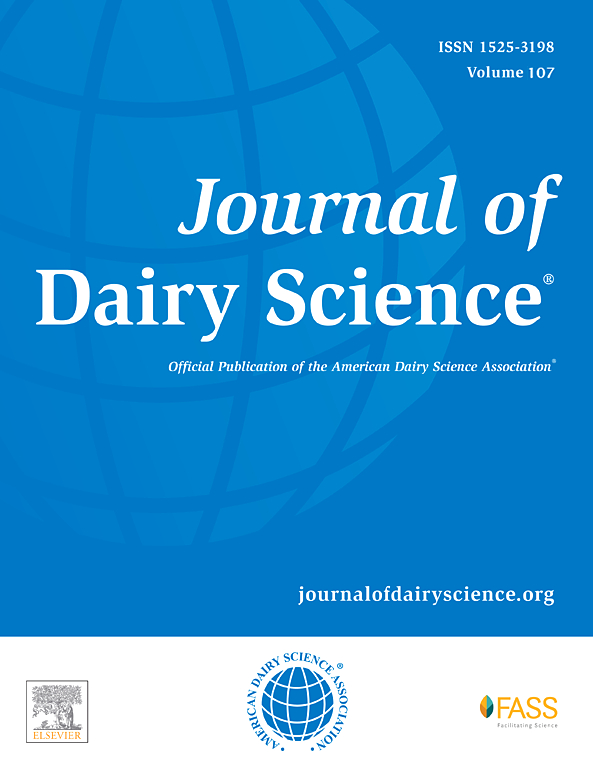通过饲喂 15%的全棉籽增加日粮脂肪对奶牛产奶量、总消化率和甲烷排放的影响
IF 3.7
1区 农林科学
Q1 AGRICULTURE, DAIRY & ANIMAL SCIENCE
引用次数: 0
摘要
本文章由计算机程序翻译,如有差异,请以英文原文为准。
Effect of increasing dietary fat by feeding 15% whole cottonseed on milk production, total-tract digestibility, and methane emission in dairy cows
Whole cottonseed (WCS) is fed as a source of fat, protein, and fiber. Cottonseed is high in unsaturated fatty acids (FA) but is considered lower risk for biohydrogenation-induced milk fat depression because it is slowly released in the rumen. Unsaturated FA have been reported to decrease methane emissions in some experiments, but the effect of FA source is unclear. The objective of the current experiment was to investigate the effect of FA from WCS on milk and methane production and total-tract nutrient digestibility. Sixteen multiparous cows were arranged in a crossover design with 21-d periods. Treatments were 15% WCS substituted for a mixture of cottonseed hulls and soybean meal. Cottonseed had no effect on DMI and milk yield (MY) but increased milk fat concentration (0.2 percentage units) and yield (110 g/d). Cottonseed also decreased the concentration of FA <16 C and 16 C in milk fat and increased FA >16 C and trans-10 18:1 and trans-11 18:1. Increasing dietary fat had no effect on the efficiency of transfer of 18 C FA to milk. There was no effect on milk protein concentration and yield. Whole cottonseed decreased apparent total-tract digestibility of OM and DM due to a decline in NDF digestibility, but less than 3% of seeds consumed were recovered intact in the feces. Whole cottonseed increased digestibility of 16 C FA, but the digestibility of total and 18 C FA were not changed. The production (g/d), yield (g/kg of DMI), and intensity (g/kg of MY or ECM) of H2, CH4, and CO2 were not changed with WCS. Plasma total gossypol and the positive and negative isomers increased with WCS but were below toxic levels. In conclusion, increasing dietary UFA by feeding 15% WCS increased milk fat yield through an increased supply of preformed FA and did not affect methane production under these dietary conditions.
求助全文
通过发布文献求助,成功后即可免费获取论文全文。
去求助
来源期刊

Journal of Dairy Science
农林科学-奶制品与动物科学
CiteScore
7.90
自引率
17.10%
发文量
784
审稿时长
4.2 months
期刊介绍:
The official journal of the American Dairy Science Association®, Journal of Dairy Science® (JDS) is the leading peer-reviewed general dairy research journal in the world. JDS readers represent education, industry, and government agencies in more than 70 countries with interests in biochemistry, breeding, economics, engineering, environment, food science, genetics, microbiology, nutrition, pathology, physiology, processing, public health, quality assurance, and sanitation.
 求助内容:
求助内容: 应助结果提醒方式:
应助结果提醒方式:


